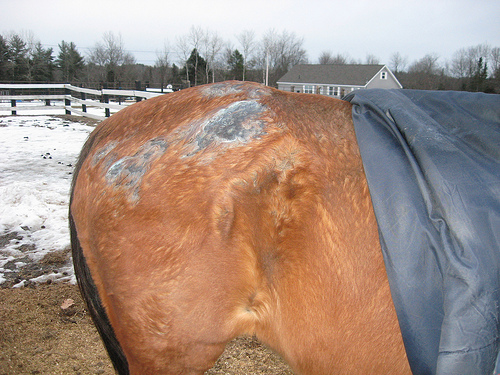Rain Rot Prevention
May 03, 2021

We’ve all heard the saying, “April showers bring May flowers.” However, wet weather after a rainy month can also create numerous health problems for your livestock and pets, especially as the temperature starts to rise and humidity increases.
One common concern that arises under these conditions is a disease that is commonly referred to as “rain rot.” Rain rot is the most common skin disease in horses, but it also affects cattle, goats, sheep, dogs, and cats.
Here are some helpful tips to keep your animals healthy this summer:
The first step in preventing rain rot in your animals is to keep them out of rain and wet areas as much as possible by providing them with access to shelter. Keeping your animals out of thick mud is also helpful because caked mud could compromise their skin.
Your animal’s skin is its first line of defense against rain rot, so make sure to address any cuts or abrasions with antimicrobial spray. Once your animal’s epidermal layer begins to break down after being exposed to wet conditions, he or she is more susceptible to wounds. Therefore, when you bathe your animals in humid conditions, take the time to scrape off the excess water to help their skin dry.
Horses can become susceptible to rain rot due to well-meaning owners who want to blanket them in rainy conditions. However, if the blanket is only water-resistant, it can actually create a warm, moist environment that is ideal for harboring bacterial spores. Therefore, ensure that you only use turnout sheets that are waterproof.
Insect bites can expose your animals to spores that penetrate the skin, causing rain rot. Frequently spraying your animals with fly repellant can prevent this from happening.
Lastly, watch for the warning signs and be proactive in your treatment. If you notice crusty scabs on your animals’ skin, they have most likely contracted rain rot, and you should begin treatment immediately to prevent further spread of the disease. Because rain rot is highly contagious, the infected animal should be isolated from others.
Following these prevention guidelines will lower your animals’ chances of contracting rain rot this year. To set your animals up for success, visit your local Co-op for medicated shampoo, waterproof turnout sheets, fly spray, and more.
For more content like this, check out the latest issue of the Cooperator.
One common concern that arises under these conditions is a disease that is commonly referred to as “rain rot.” Rain rot is the most common skin disease in horses, but it also affects cattle, goats, sheep, dogs, and cats.
Here are some helpful tips to keep your animals healthy this summer:
The first step in preventing rain rot in your animals is to keep them out of rain and wet areas as much as possible by providing them with access to shelter. Keeping your animals out of thick mud is also helpful because caked mud could compromise their skin.
Your animal’s skin is its first line of defense against rain rot, so make sure to address any cuts or abrasions with antimicrobial spray. Once your animal’s epidermal layer begins to break down after being exposed to wet conditions, he or she is more susceptible to wounds. Therefore, when you bathe your animals in humid conditions, take the time to scrape off the excess water to help their skin dry.
Horses can become susceptible to rain rot due to well-meaning owners who want to blanket them in rainy conditions. However, if the blanket is only water-resistant, it can actually create a warm, moist environment that is ideal for harboring bacterial spores. Therefore, ensure that you only use turnout sheets that are waterproof.
Insect bites can expose your animals to spores that penetrate the skin, causing rain rot. Frequently spraying your animals with fly repellant can prevent this from happening.
Lastly, watch for the warning signs and be proactive in your treatment. If you notice crusty scabs on your animals’ skin, they have most likely contracted rain rot, and you should begin treatment immediately to prevent further spread of the disease. Because rain rot is highly contagious, the infected animal should be isolated from others.
Following these prevention guidelines will lower your animals’ chances of contracting rain rot this year. To set your animals up for success, visit your local Co-op for medicated shampoo, waterproof turnout sheets, fly spray, and more.
For more content like this, check out the latest issue of the Cooperator.